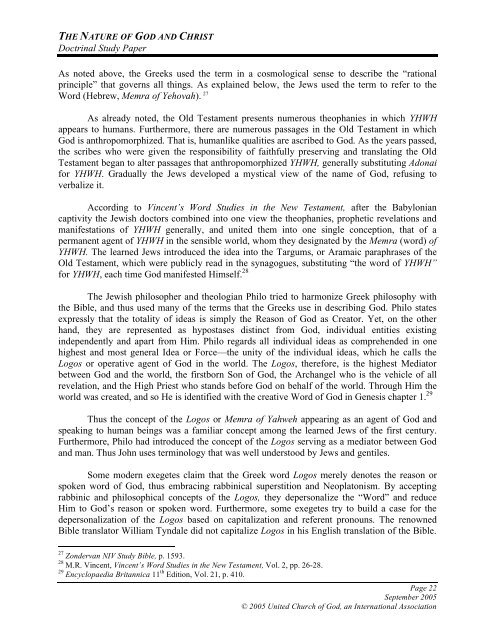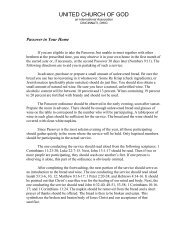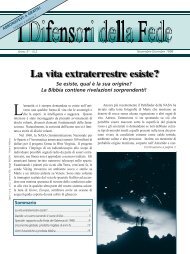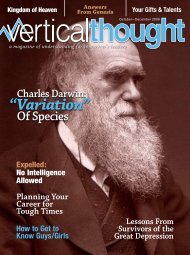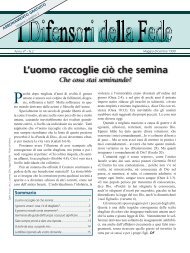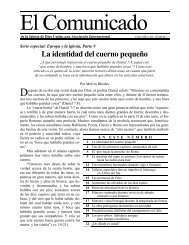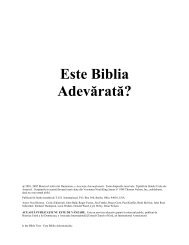The Nature of God and Christ - Members Site - United Church of God
The Nature of God and Christ - Members Site - United Church of God
The Nature of God and Christ - Members Site - United Church of God
- No tags were found...
You also want an ePaper? Increase the reach of your titles
YUMPU automatically turns print PDFs into web optimized ePapers that Google loves.
THE NATURE OF GOD AND CHRISTDoctrinal Study PaperAs noted above, the Greeks used the term in a cosmological sense to describe the “rationalprinciple” that governs all things. As explained below, the Jews used the term to refer to theWord (Hebrew, Memra <strong>of</strong> Yehovah). 27As already noted, the Old Testament presents numerous theophanies in which YHWHappears to humans. Furthermore, there are numerous passages in the Old Testament in which<strong>God</strong> is anthropomorphized. That is, humanlike qualities are ascribed to <strong>God</strong>. As the years passed,the scribes who were given the responsibility <strong>of</strong> faithfully preserving <strong>and</strong> translating the OldTestament began to alter passages that anthropomorphized YHWH, generally substituting Adonaifor YHWH. Gradually the Jews developed a mystical view <strong>of</strong> the name <strong>of</strong> <strong>God</strong>, refusing toverbalize it.According to Vincent’s Word Studies in the New Testament, after the Babyloniancaptivity the Jewish doctors combined into one view the theophanies, prophetic revelations <strong>and</strong>manifestations <strong>of</strong> YHWH generally, <strong>and</strong> united them into one single conception, that <strong>of</strong> apermanent agent <strong>of</strong> YHWH in the sensible world, whom they designated by the Memra (word) <strong>of</strong>YHWH. <strong>The</strong> learned Jews introduced the idea into the Targums, or Aramaic paraphrases <strong>of</strong> theOld Testament, which were publicly read in the synagogues, substituting “the word <strong>of</strong> YHWH”for YHWH, each time <strong>God</strong> manifested Himself. 28<strong>The</strong> Jewish philosopher <strong>and</strong> theologian Philo tried to harmonize Greek philosophy withthe Bible, <strong>and</strong> thus used many <strong>of</strong> the terms that the Greeks use in describing <strong>God</strong>. Philo statesexpressly that the totality <strong>of</strong> ideas is simply the Reason <strong>of</strong> <strong>God</strong> as Creator. Yet, on the otherh<strong>and</strong>, they are represented as hypostases distinct from <strong>God</strong>, individual entities existingindependently <strong>and</strong> apart from Him. Philo regards all individual ideas as comprehended in onehighest <strong>and</strong> most general Idea or Force—the unity <strong>of</strong> the individual ideas, which he calls theLogos or operative agent <strong>of</strong> <strong>God</strong> in the world. <strong>The</strong> Logos, therefore, is the highest Mediatorbetween <strong>God</strong> <strong>and</strong> the world, the firstborn Son <strong>of</strong> <strong>God</strong>, the Archangel who is the vehicle <strong>of</strong> allrevelation, <strong>and</strong> the High Priest who st<strong>and</strong>s before <strong>God</strong> on behalf <strong>of</strong> the world. Through Him theworld was created, <strong>and</strong> so He is identified with the creative Word <strong>of</strong> <strong>God</strong> in Genesis chapter 1. 29Thus the concept <strong>of</strong> the Logos or Memra <strong>of</strong> Yahweh appearing as an agent <strong>of</strong> <strong>God</strong> <strong>and</strong>speaking to human beings was a familiar concept among the learned Jews <strong>of</strong> the first century.Furthermore, Philo had introduced the concept <strong>of</strong> the Logos serving as a mediator between <strong>God</strong><strong>and</strong> man. Thus John uses terminology that was well understood by Jews <strong>and</strong> gentiles.Some modern exegetes claim that the Greek word Logos merely denotes the reason orspoken word <strong>of</strong> <strong>God</strong>, thus embracing rabbinical superstition <strong>and</strong> Neoplatonism. By acceptingrabbinic <strong>and</strong> philosophical concepts <strong>of</strong> the Logos, they depersonalize the “Word” <strong>and</strong> reduceHim to <strong>God</strong>’s reason or spoken word. Furthermore, some exegetes try to build a case for thedepersonalization <strong>of</strong> the Logos based on capitalization <strong>and</strong> referent pronouns. <strong>The</strong> renownedBible translator William Tyndale did not capitalize Logos in his English translation <strong>of</strong> the Bible.27 Zondervan NIV Study Bible, p. 1593.28 M.R. Vincent, Vincent’s Word Studies in the New Testament, Vol. 2, pp. 26-28.29 Encyclopaedia Britannica 11 th Edition, Vol. 21, p. 410.Page 22September 2005© 2005 <strong>United</strong> <strong>Church</strong> <strong>of</strong> <strong>God</strong>, an International Association


